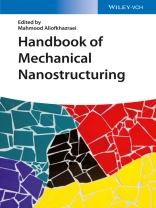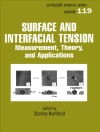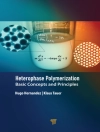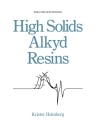Providing in-depth information on how to obtain high-performance materials by controlling their nanostructures, this ready reference covers both the bottom-up and the top-down approaches to the synthesis and processing of nanostructured materials.
The focus is on advanced methods of mechanical nanostructuring such as severe plastic deformation, including high pressure torsion, equal channel angular processing, cyclic extrusion compression, accumulative roll bonding, and surface mechanical attrition treatment. As such, the contents are inherently application-oriented, with the methods presented able to be easily integrated into existing production processes. In addition, the structure-property relationships and ways of influencing the nanostructure in order to exhibit a desired functionality are reviewed in detail. The whole is rounded off by a look at future directions, followed by an overview of applications in various fields of structural and mechanical engineering.
With its solutions for successful processing of complex-shaped workpieces and large-scale specimens with desired properties, this is an indispensable tool for purposeful materials design.
Jadual kandungan
List of Contributors XIX
Preface XXXI
Part I Mechanical Properties of Nanostructured Materials 1
1 Mechanical Properties of Nanocrystalline Materials 3
Pasquale Cavaliere
1.1 Introduction 3
1.2 Static Properties 5
1.3 Wear Properties 10
1.4 Fatigue Properties 11
1.5 Crack Behavior 12
1.6 Conclusions 14
References 15
2 Superior Mechanical Properties of Nanostructured Light Metallic Materials and Their Innovation Potential 17
Maxim Murashkin, Ilchat Sabirov, Nariman Enikeev, and Ruslan Valiev
2.1 Introduction 17
2.2 Nanostructuring of Light Metallic Materials Using SPD Methods 19
2.3 Superior Mechanical Strength of NS Light Metals and Alloys 20
2.4 Fatigue Behavior of NS Light Metals 24
2.5 Innovation Potential and Application of the NS Light Metals and Alloys 26
2.6 Conclusions 29
Acknowledgments 29
References 29
3 Understanding the Mechanical Properties of Nanostructured Bainite 35
Carlos Garcia-Mateo and Francisca G. Caballero
3.1 Introduction 35
3.2 NANOBAIN: Significant Extension of the Bainite Transformation Theory 35
3.3 Microstructural Characterization of Nanostructured Bainitic Steels 46
3.4 Understanding the Advanced Bainitic Steel Mechanical Properties 50
3.5 Summary 58
Acknowledgments 58
References 59
4 Inherent Strength of Nano-Polycrystalline Materials 67
Tatjana I. Mazilova, Igor M. Mikhailovskij, and Evgenij V. Sadanov
4.1 Introduction 67
4.2 High-field Tensile Testing 69
4.3 Tensile Strength of Nanosized Monocrystals 70
4.4 Inherent Strength of Bicrystals 74
4.5 Conclusions 77
References 78
5 State-of-the-Art Optical Microscopy and AFM-Based Property Measurement of Nanostructure Materials 81
Yangjie Wei, Chengdong Wu, and Zaili Dong
5.1 Introduction 81
5.2 Applications of Optical Microscopy and AFM 87
5.3 New Developments of Optical Microscopy and AFM Techniques 94
5.4 Conclusion 110
References 111
6 Strength and Electrical Conductivity of Bulk Nanostructured Cu and Cu-Based Alloys Produced by SPD 115
Wei Wei, Kun Xia Wei, Qing Bo Du, Fanil F. Musin, Jing Hu, and Igor V. Alexandrov
6.1 Introduction 115
6.2 Microstructure and Strength and Electrical Conductivity of Bulk Nanostructured Cu Produced by SPD 117
6.3 Bulk Nanostructured Precipitation-Hardenable Cu–Cr Alloys from SPD 121
6.4 Bulk Nanostructured Cu–Cr In Situ Fibrous Composites Produced by SPD 128
6.5 Perspectives for Industrial Applications of SPD to Produce Bulk Nanostructured Cu and Cu-Based Alloys with High Strength and High Electrical Conductivity 136
6.6 Conclusion 137
Acknowledgements 138
References 138
7 Mechanical Properties and Dislocation Boundary Mechanisms during Equal-Channel Angular Pressing (ECAP) 143
Marcello Cabibbo
7.1 Introduction 143
7.2 Strength Contributions to Yield Stress 148
7.3 Model Validation: Case Study 151
7.4 General Remarks and Prospects 159
References 160
8 Mechanical Properties of Nanoparticles: Characterization by In situ Nanoindentation Inside a Transmission Electron Microscope 163
Lucile Joly-Pottuz, Emilie Calvie, Julien Rethorie, Sylvain Meille, Claude Esnouf, Jerome Chevalier, and Karine Masenelli-Varlot
8.1 Introduction 163
8.2 In situ TEM Nanoindentation Developments 164
8.3 Examples of In situ Nanoindentation Tests on Nanoparticles 169
8.4 Data Processing 170
8.5 Interest of Simulation on the Data Processing 174
8.6 Conclusion 177
References 178
9 Improved Mechanical Properties by Nanostructuring – Specific Considerations under Dynamic Load Conditions 181
Anne Jung, Stefan Diebels, and Erhardt Lach
9.1 Introduction 181
9.2 General Considerations for Nanostructured Bulk Materials 182
9.3 Nanoparticle-Strengthened Nanometal–Matrix Composites 190
9.4 Improved Mechanical Properties by Nanostructured Coatings 200
9.5 Conclusion 206
References 206
10 Mechanical Properties of Bio-Nanostructured Materials 211
Parvez Alam
10.1 Introduction 211
10.2 Types of Nanostructured Composites 212
10.3 Surface Effects 212
10.4 Biopolymer Nanocrystals and the Benefits of Hydrogen Bonding 215
10.5 Nanointerlocking Mechanisms 218
10.6 Methods for Determining the Nanomechanical Properties of Materials 223
10.7 Conclusions 230
References 231
Part II Mechanical Nanostructuring Methods 235
11 SPD Processes – Methods for Mechanical Nanostructuring 237
Radim Kocich and Pavel Lukaic
11.1 Introduction 237
11.2 Classification of SPD Methods 238
11.3 HPT (High-Pressure Torsion) 240
11.4 ECAP (Equal-Channel Angular Pressing) 241
11.5 Development of the ECAP Technique 243
11.6 HPT Development 247
11.7 ECAP Development 248
11.8 FEM Simulation of SPD Processes 250
11.9 Materials for SPD Techniques 252
11.10 Conclusion 257
Acknowledgments 258
References 258
12 Mechanical Alloying/Milling 263
Fatma Hadef and Amara Otmani
12.1 Introduction 263
12.2 History and Development 264
12.3 Milling Process 265
12.4 Mechanism of Mechanical Alloying/Milling 265
12.5 Process Variables 268
12.6 Summary 274
References 274
13 Equal-Channel Angular Pressing (ECAP) 277
Balasubramanian Ravisankar
13.1 Introduction 277
13.2 Die Design and Modifications 278
13.3 Influence of External and Internal Parameters 282
13.4 ECAP of Aluminum and Its Alloys 284
13.5 ECAP of Copper 287
13.6 ECAP of Titanium 290
13.7 ECAP of Magnesium and Steels 293
13.8 ECAP for Consolidation of Powders 294
13.9 Suitability for Large-Scale Production 295
13.10 Summary 295
References 296
14 Severe Shot Peening to Obtain Nanostructured Surfaces: Process and Properties of the Treated Surfaces 299
Sara Bagherifard, Ines Fernandez-Pariente, Ramin Ghelichi, and Mario Guagliano
14.1 Introduction 299
14.2 Surface Characterization of Materials Treated by Severe Shot Peening 304
14.3 Mechanical Properties of Materials Treated by Severe Shot Peening 311
14.4 Potential Biomedical Applications of SSP 316
14.5 Conclusions 319
References 320
15 Nanocrystallization by Surface Mechanical Attrition Treatment 325
Hamidreza Bagheri, Morteza Gheytani, Hamidreza Masiha, Mahmood Aliofkhazraei, and Alireza Sabour Rouhaghdam
15.1 Introduction 325
15.2 Classification of Nanocrystalline Materials 326
15.3 Techniques for Synthesis of Nanocrystalline Materials 328
15.4 Surface Nanocrystallization Mechanisms 343
15.5 Conclusions 370
References 370
16 Fabrication of Nanostructured Materials by Mechanical Milling 379
Debasis Chaira and Swapan Kumar Karak
16.1 Introduction 379
16.2 Preamble 380
16.3 Historical Background of Mechanical Alloying 380
16.4 Reaction Milling/Mechanochemical Process 382
16.5 Formation Mechanism of Nanostructures by Milling 383
16.6 Milling Equipment 386
16.7 Processing Variables in Milling 390
16.8 Wet versus Dry Milling 395
16.9 Synthesis of Nanostructured Materials by Milling 397
16.10 Scope and Mechanism of Nanostructured Materials Synthesized by Milling 400
16.11 Densification of Nanocrystalline Powders 401
16.12 Defects in Mechanically Alloyed Powders 409
16.13 Conclusions 411
Acknowledgments 411
References 412
Contents to Volume 2
List of Contributors XV
Preface XXVII
17 Ultrasonic Impact Treatment – An Effective Method for Nanostructuring the Surface Layers in Metallic Materials 417
Bohdan N. Mordyuk and Georgiy I. Prokopenko
18 Metal Nanostructuring through Cryodeformation under All-Round Compression 435
Pavel A. Khaimovich
19 Application of Milling in Synthesizing Nanostructured Metal Matrix Composite Powder 449
Mohammad R. Allazadeh and Csaba Balazsi
20 Synthesis and Properties of Nanostructured Powders by Milling Process 471
Sonia Azzaza and Mohamed Bououdina
21 Nanostructures from Reactive High-Energy Ball Milling 493
Brian S. Mitchell
Part III: Application and Development of Mechanical Nanostructuring 511
22 The Mechanochemical Route to Nanoscale 513
Francesco Delogu and Carlo Ricci
23 Cavitation Disintegration of Powder Microparticles 533
Richard Dvorsky and Jana Trojkova
24 Unique Properties of Metal Nanomaterials for Gems and Jewelry Applications 551
Prompong Pienpinijtham and Pimthong Thongnopkun
25 Hybrid Processing of Electroceramic Composites Involving High-Energy Ball Milling 577
Hongfang Zhang, Ling Bing Kong, Helen L.-W. Chan, Chee-Leung Mak, Xi Yao, Yu Wang, and Zhi Gang Chen
26 Development and Application of Equal Channel Angular Pressing Technique for Grain Refinement of Nanocrystalline Materials 613
Sanusi K. Oladele and Afolabi A. Samuel
27 Polar Oxide Nanopowders Prepared by Mechanical Treatments 641
Jurij Koruza, Tadej Rojac, and Barbara Malic
28 High-Energy Ball Milling as a General Tool for Nanomaterials Synthesis and Processing 663
Marzia Pentimalli, Mariangela Bellusci, and Franco Padella
29 Consolidation of Mechanically Alloyed Products/Powders 681
Debdas Roy
30 Surface Nanostructuring through a Technique Derived from Shot-Peening: Recent Advances 701
Constance Morel and Mario Guagliano
31 Mechanochemical Synthesis of Nanostructured Materials for Energy Conversion and Storage Devices 717
Dandan Zhao and Hulin Li
Index 735
Mengenai Pengarang
Dr. Mahmood Aliofkhazraei is a researcher in the corrosion and surface engineering group at the Tarbiat Modares University. Dr. Aliofkhazraei has received several honors, including the Khwarizmi award and the best young nanotechnologist award of his country. He is a member of the National Association of Surface Sciences, Iranian Corrosion Association, and National Elite Foundation of Iran. His research focuses on nanotechnology and its use in surface and corrosion science.












